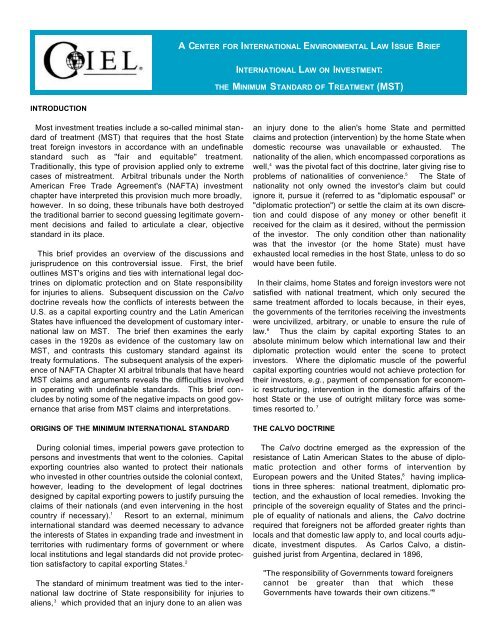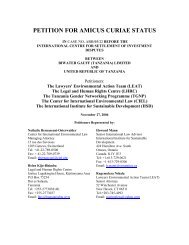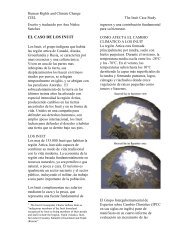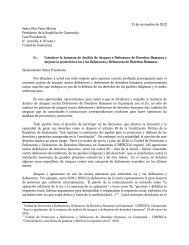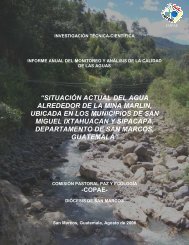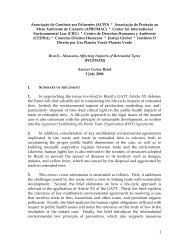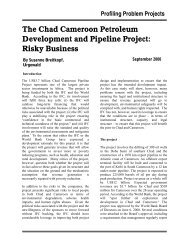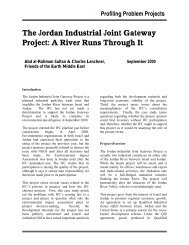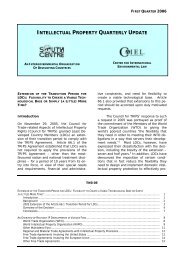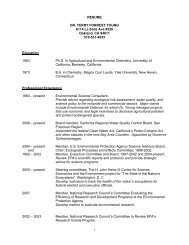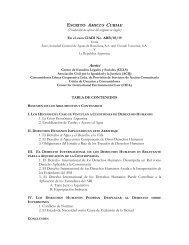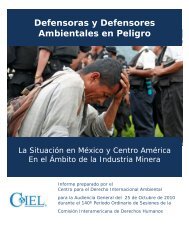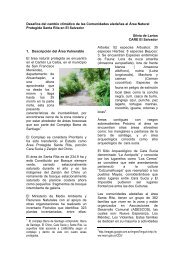International Law on Investment: The Minimum Standard of Treatment
International Law on Investment: The Minimum Standard of Treatment
International Law on Investment: The Minimum Standard of Treatment
You also want an ePaper? Increase the reach of your titles
YUMPU automatically turns print PDFs into web optimized ePapers that Google loves.
A CENTER FOR INTERNATIONAL ENVIRONMENTAL LAW ISSUE BRIEFINTERNATIONAL LAW ON INVESTMENT:THE MINIMUM STANDARD OF TREATMENT (MST)INTRODUCTIONMost investment treaties include a so-called minimal standard<strong>of</strong> treatment (MST) that requires that the host Statetreat foreign investors in accordance with an undefinablestandard such as "fair and equitable" treatment.Traditi<strong>on</strong>ally, this type <strong>of</strong> provisi<strong>on</strong> applied <strong>on</strong>ly to extremecases <strong>of</strong> mistreatment. Arbitral tribunals under the NorthAmerican Free Trade Agreement's (NAFTA) investmentchapter have interpreted this provisi<strong>on</strong> much more broadly,however. In so doing, these tribunals have both destroyedthe traditi<strong>on</strong>al barrier to sec<strong>on</strong>d guessing legitimate governmentdecisi<strong>on</strong>s and failed to articulate a clear, objectivestandard in its place.This brief provides an overview <strong>of</strong> the discussi<strong>on</strong>s andjurisprudence <strong>on</strong> this c<strong>on</strong>troversial issue. First, the briefoutlines MST's origins and ties with internati<strong>on</strong>al legal doctrines<strong>on</strong> diplomatic protecti<strong>on</strong> and <strong>on</strong> State resp<strong>on</strong>sibilityfor injuries to aliens. Subsequent discussi<strong>on</strong> <strong>on</strong> the Calvodoctrine reveals how the c<strong>on</strong>flicts <strong>of</strong> interests between theU.S. as a capital exporting country and the Latin AmericanStates have influenced the development <strong>of</strong> customary internati<strong>on</strong>allaw <strong>on</strong> MST. <strong>The</strong> brief then examines the earlycases in the 1920s as evidence <strong>of</strong> the customary law <strong>on</strong>MST, and c<strong>on</strong>trasts this customary standard against itstreaty formulati<strong>on</strong>s. <strong>The</strong> subsequent analysis <strong>of</strong> the experience<strong>of</strong> NAFTA Chapter XI arbitral tribunals that have heardMST claims and arguments reveals the difficulties involvedin operating with undefinable standards. This brief c<strong>on</strong>cludesby noting some <strong>of</strong> the negative impacts <strong>on</strong> good governancethat arise from MST claims and interpretati<strong>on</strong>s.ORIGINS OF THE MINIMUM INTERNATIONAL STANDARDDuring col<strong>on</strong>ial times, imperial powers gave protecti<strong>on</strong> topers<strong>on</strong>s and investments that went to the col<strong>on</strong>ies. Capitalexporting countries also wanted to protect their nati<strong>on</strong>alswho invested in other countries outside the col<strong>on</strong>ial c<strong>on</strong>text,however, leading to the development <strong>of</strong> legal doctrinesdesigned by capital exporting powers to justify pursuing theclaims <strong>of</strong> their nati<strong>on</strong>als (and even intervening in the hostcountry if necessary). 1 Resort to an external, minimuminternati<strong>on</strong>al standard was deemed necessary to advancethe interests <strong>of</strong> States in expanding trade and investment interritories with rudimentary forms <strong>of</strong> government or wherelocal instituti<strong>on</strong>s and legal standards did not provide protecti<strong>on</strong>satisfactory to capital exporting States. 2<strong>The</strong> standard <strong>of</strong> minimum treatment was tied to the internati<strong>on</strong>allaw doctrine <strong>of</strong> State resp<strong>on</strong>sibility for injuries toaliens, 3 which provided that an injury d<strong>on</strong>e to an alien wasan injury d<strong>on</strong>e to the alien's home State and permittedclaims and protecti<strong>on</strong> (interventi<strong>on</strong>) by the home State whendomestic recourse was unavailable or exhausted. <strong>The</strong>nati<strong>on</strong>ality <strong>of</strong> the alien, which encompassed corporati<strong>on</strong>s aswell, 4 was the pivotal fact <strong>of</strong> this doctrine, later giving rise toproblems <strong>of</strong> nati<strong>on</strong>alities <strong>of</strong> c<strong>on</strong>venience. 5 <strong>The</strong> State <strong>of</strong>nati<strong>on</strong>ality not <strong>on</strong>ly owned the investor's claim but couldignore it, pursue it (referred to as "diplomatic espousal" or"diplomatic protecti<strong>on</strong>") or settle the claim at its own discreti<strong>on</strong>and could dispose <strong>of</strong> any m<strong>on</strong>ey or other benefit itreceived for the claim as it desired, without the permissi<strong>on</strong><strong>of</strong> the investor. <strong>The</strong> <strong>on</strong>ly c<strong>on</strong>diti<strong>on</strong> other than nati<strong>on</strong>alitywas that the investor (or the home State) must haveexhausted local remedies in the host State, unless to do sowould have been futile.In their claims, home States and foreign investors were notsatisfied with nati<strong>on</strong>al treatment, which <strong>on</strong>ly secured thesame treatment afforded to locals because, in their eyes,the governments <strong>of</strong> the territories receiving the investmentswere uncivilized, arbitrary, or unable to ensure the rule <strong>of</strong>law. 6 Thus the claim by capital exporting States to anabsolute minimum below which internati<strong>on</strong>al law and theirdiplomatic protecti<strong>on</strong> would enter the scene to protectinvestors. Where the diplomatic muscle <strong>of</strong> the powerfulcapital exporting countries would not achieve protecti<strong>on</strong> fortheir investors, e.g., payment <strong>of</strong> compensati<strong>on</strong> for ec<strong>on</strong>omicrestructuring, interventi<strong>on</strong> in the domestic affairs <strong>of</strong> thehost State or the use <strong>of</strong> outright military force was sometimesresorted to. 7THE CALVO DOCTRINE<strong>The</strong> Calvo doctrine emerged as the expressi<strong>on</strong> <strong>of</strong> theresistance <strong>of</strong> Latin American States to the abuse <strong>of</strong> diplomaticprotecti<strong>on</strong> and other forms <strong>of</strong> interventi<strong>on</strong> byEuropean powers and the United States, 8 having implicati<strong>on</strong>sin three spheres: nati<strong>on</strong>al treatment, diplomatic protecti<strong>on</strong>,and the exhausti<strong>on</strong> <strong>of</strong> local remedies. Invoking theprinciple <strong>of</strong> the sovereign equality <strong>of</strong> States and the principle<strong>of</strong> equality <strong>of</strong> nati<strong>on</strong>als and aliens, the Calvo doctrinerequired that foreigners not be afforded greater rights thanlocals and that domestic law apply to, and local courts adjudicate,investment disputes. As Carlos Calvo, a distinguishedjurist from Argentina, declared in 1896,"<strong>The</strong> resp<strong>on</strong>sibility <strong>of</strong> Governments toward foreignerscannot be greater than that which theseGovernments have towards their own citizens." 9
In the North American Dredging Company case in 1926,the United States-Mexican Claims Commissi<strong>on</strong> authoritativelyexpounded the nature and scope <strong>of</strong> the Calvo Clause.This case involved two legal instruments: a c<strong>on</strong>tractbetween a U.S. corporati<strong>on</strong> and the Government <strong>of</strong> Mexicoand a Treaty between the United States and Mexico establishinga Claims Commissi<strong>on</strong>. <strong>The</strong> c<strong>on</strong>tract included aclause (18) whereby the c<strong>on</strong>tractor and its employees wouldbe "c<strong>on</strong>sidered as Mexicans in all matters", would not "enjoyany other rights than those established in favor <strong>of</strong>Mexicans", and were "c<strong>on</strong>sequently deprived <strong>of</strong> any rightsas aliens". In c<strong>on</strong>trast, the treaty establishing theCommissi<strong>on</strong> dispensed with the need to exhaust the localremedies rule. After careful analysis <strong>of</strong> the Calvo clauseincluded in the c<strong>on</strong>tract, the Claims Commissi<strong>on</strong> found thatthe investor had waived his right to request diplomatic protecti<strong>on</strong>in any matter arising out <strong>of</strong> the c<strong>on</strong>tract and dismissedthe claim. 10<strong>The</strong> insistence <strong>on</strong> subjecting foreign investment solely tothe domestic law <strong>of</strong> the host State has been adopted andrepeatedly reiterated in the C<strong>on</strong>ferences <strong>of</strong> AmericanStates, e.g., Washingt<strong>on</strong> C<strong>on</strong>ference in 1889. Elements <strong>of</strong>the Calvo doctrine have also been introduced to the lawsand c<strong>on</strong>stituti<strong>on</strong>s <strong>of</strong> several countries in Latin America.<strong>The</strong>se elements <strong>of</strong> State practice, followed by a sense <strong>of</strong>legal obligati<strong>on</strong>, may be evidence <strong>of</strong> regi<strong>on</strong>al customary law<strong>on</strong> the treatment <strong>of</strong> foreign investments in Latin America, aswell as evidence <strong>of</strong> oppositi<strong>on</strong> to the formati<strong>on</strong> <strong>of</strong> internati<strong>on</strong>alcustom regarding State resp<strong>on</strong>sibility for injuries toaliens and <strong>of</strong> persistent objecti<strong>on</strong> to the applicati<strong>on</strong> <strong>of</strong> suchcustom to these States.During the last decades, however, the positi<strong>on</strong>s in thisdebate have changed c<strong>on</strong>siderably. Mexico, a l<strong>on</strong>g-timeprop<strong>on</strong>ent <strong>of</strong> the Calvo doctrine, has accepted Chapter XI <strong>of</strong>the NAFTA. Many other countries in Latin America haveentered into bilateral investment treaties (BITs) c<strong>on</strong>tainingdisciplines and language that also significantly depart fromthe Calvo doctrine. In ir<strong>on</strong>ic c<strong>on</strong>trast, in 2002 the U.S.C<strong>on</strong>gress passed the Trade Promoti<strong>on</strong> Authority Actinstructing its trade negotiators to ensure that foreigninvestors are not accorded greater substantive rights thanU.S. nati<strong>on</strong>als. 11 This language is clearly reminiscent <strong>of</strong>Calvo, and flows from the greater sensitivities in U.S. federal,State, and local governments affected by NAFTA ChapterXI cases. <strong>The</strong> impacts <strong>of</strong> these recent developments, c<strong>on</strong>trastedagainst century-old positi<strong>on</strong>s and c<strong>on</strong>troversy, areyet to be assessed.<strong>on</strong> the basis <strong>of</strong> internati<strong>on</strong>al law, and in exercising thispower, it heard the Neer and the Roberts cases. <strong>The</strong> decisi<strong>on</strong>s<strong>of</strong> the Claims Commissi<strong>on</strong> have been regarded asauthoritative formulati<strong>on</strong>s <strong>of</strong> the minimum internati<strong>on</strong>al lawstandard for treatment <strong>of</strong> aliens.Paul Neer was a U.S. nati<strong>on</strong>al murdered by a group <strong>of</strong> men<strong>on</strong> his way back from a mine, where he served as superintendent.His wife filed a claim arguing that the Mexicanauthorities had shown unwarranted lack <strong>of</strong> diligence ininvestigating the murder. <strong>The</strong> Claims Commissi<strong>on</strong> notedthat while the authorities might have acted in a more vigorousand effective way than they did, it was not for an internati<strong>on</strong>altribunal to decide whether another course <strong>of</strong> proceduretaken by the local authorities might have been moreeffective. <strong>The</strong> Claims Commissi<strong>on</strong> expressed the minimumstandard in the following terms,[T]he propriety <strong>of</strong> governmental acts should be put tothe test <strong>of</strong> internati<strong>on</strong>al standards, and…. <strong>The</strong> treatment<strong>of</strong> an alien, in order to c<strong>on</strong>stitute an internati<strong>on</strong>aldelinquency, should amount to an outrage, to badfaith, to willful neglect <strong>of</strong> duty, or to an insufficiency<strong>of</strong> governmental acti<strong>on</strong> so far short <strong>of</strong> internati<strong>on</strong>alstandards that every reas<strong>on</strong>able and impartial manwould readily recognize its insufficiency. Whetherthis insufficiency proceeds from deficient executi<strong>on</strong><strong>of</strong> an intelligent law or from the fact that the laws <strong>of</strong>the country do not empower the authorities to measureup to internati<strong>on</strong>al standards is immaterial. 12Roberts was a U.S. nati<strong>on</strong>al c<strong>on</strong>fined for nineteen m<strong>on</strong>thsin a small cell al<strong>on</strong>g with thirty or forty other men, with nocleaning or sanitary facilities, no furniture, and no opportunitiesto exercise. <strong>The</strong> Claims Commissi<strong>on</strong> declared thatequality, although relevant in determining the merits <strong>of</strong> acomplaint <strong>of</strong> mistreatment <strong>of</strong> an alien, is not the ultimate test<strong>of</strong> the propriety <strong>of</strong> the acts <strong>of</strong> authorities in the light <strong>of</strong> internati<strong>on</strong>allaw. Rather, the test is whether aliens are treatedin accordance with ordinary standards <strong>of</strong> civilizati<strong>on</strong>. <strong>The</strong>Claims Commissi<strong>on</strong> c<strong>on</strong>cluded that that the treatment <strong>of</strong>Roberts was such as to warrant an indemnity <strong>on</strong> the ground<strong>of</strong> cruel and inhumane impris<strong>on</strong>ment. In the Roberts case,the Claims Commissi<strong>on</strong> applied the Neer standard, wherebyevery reas<strong>on</strong>able and impartial man would readily recognizeoutrage.MST AND TREATIES OF FRIENDSHIP, COMMERCE, ANDNAVIGATIONTHE EARLY CASES IN THE 1920S AS EVIDENCE OF MST INCUSTOMARY LAWDuring the decade <strong>of</strong> revoluti<strong>on</strong>ary activity between 1910and 1920, Mexico experienced great political and social turmoil.After stability returned, Mexico entered into separateclaims agreements with five European States and theUnited States, whose nati<strong>on</strong>als had suffered injuries duringthe previous decade. <strong>The</strong> United States-MexicoCommissi<strong>on</strong> was granted jurisdicti<strong>on</strong> to decide these cases2During the XXth century, the debate whether an internati<strong>on</strong>alcustom providing for a minimum standard <strong>of</strong> treatmentfor investments evolved in parallel with the c<strong>on</strong>clusi<strong>on</strong> <strong>of</strong>treaties establishing distinct legal regimes for the protecti<strong>on</strong><strong>of</strong> foreign investment. This overlap between customary lawand c<strong>on</strong>venti<strong>on</strong>al law introduces a degree <strong>of</strong> complexity tothe debate over MST, which calls for examinati<strong>on</strong> <strong>of</strong> friendship,commerce, and navigati<strong>on</strong> (FCN) treaties, the influentialICJ's decisi<strong>on</strong> in the ELSI case, and the emergence <strong>of</strong>modern-day bilateral investment treaties (BITs).THE CENTER FOR INTERNATIONAL ENVIRONMENTAL LAW AUGUST, 2003
As regards c<strong>on</strong>venti<strong>on</strong>al law, FCN treaties 13 introduced astandard reference to internati<strong>on</strong>al law in regards to the protecti<strong>on</strong><strong>of</strong> aliens. Many <strong>of</strong> the FCN Treaties c<strong>on</strong>cluded in thelatter half <strong>of</strong> the XXth century also introduced provisi<strong>on</strong>sgranting jurisdicti<strong>on</strong> to the <str<strong>on</strong>g>Internati<strong>on</strong>al</str<strong>on</strong>g> Court <strong>of</strong> Justice(ICJ) to adjudicate disputes. Although the earlier FCNtreaties dealt more with the rights <strong>of</strong> aliens in host States,focusing mainly <strong>on</strong> procedural due process, the FCNtreaties <strong>of</strong> the XXth Century c<strong>on</strong>tained provisi<strong>on</strong>s specific toinvestments, which were later refined into BITs.CASE CONCERNING ELETTRONICA SICULA S.P.A. (ELSI)<strong>The</strong> ELSI Case was brought before a Chamber <strong>of</strong> the ICJby the United States for alleged breach <strong>of</strong> an FCN treatywith Italy, which prohibited "arbitrary and discriminatorymeasures" and provided "c<strong>on</strong>stant protecti<strong>on</strong> and security"to the pers<strong>on</strong> and property <strong>of</strong> nati<strong>on</strong>als <strong>of</strong> the other party.<strong>The</strong> case involved the temporary requisiti<strong>on</strong>ing <strong>of</strong> a foreigncompany by the local major (acti<strong>on</strong>s later found unlawful byItalian Courts), who acted to prevent industrial strife at theplant when the company announced its plans for liquidati<strong>on</strong>.Of significance is the fact that many BITs granted jurisdicti<strong>on</strong>to the <str<strong>on</strong>g>Internati<strong>on</strong>al</str<strong>on</strong>g> Centre for the Settlement <strong>of</strong><strong>Investment</strong> Disputes (ICSID) for the settlement <strong>of</strong> disputesbetween the investor and the host State. 18 ICSID resurfacedthe old mixed-claims tribunals and created aninvestor-state arbitral mechanism, 19 which ultimately permitsthe investor to advance whatever arguments <strong>on</strong> MSTthat will strengthen its claims. In the c<strong>on</strong>text <strong>of</strong> NAFTAChapter XI, some claimants argued, as they had regardingearlier BITs, that "fair and equitable" are additi<strong>on</strong>al to orbey<strong>on</strong>d MST.THE FIRST NAFTA CHAPTER XI AWARDSIn the NAFTA Chapter XI c<strong>on</strong>text, the MST is c<strong>on</strong>tained inArticle 1105(1), which reads:Each Party shall accord to investments <strong>of</strong> investors<strong>of</strong> another Party treatment in accordance with internati<strong>on</strong>allaw, including fair and equitable treatmentand full protecti<strong>on</strong> and security.<strong>The</strong> first four arbitral tribunals established under NAFTAChapter XI had to grapple with the terms <strong>of</strong> this provisi<strong>on</strong>.<strong>The</strong> uncertainties involved in this area <strong>of</strong> the law gave riseto idiosyncratic interpretati<strong>on</strong>s and decisi<strong>on</strong>s that were atodds with the Parties' understanding <strong>of</strong> MST and Article1105(1).<strong>The</strong> ICJ's Chamber held that the "protecti<strong>on</strong> and security"must c<strong>on</strong>form to the minimum internati<strong>on</strong>al standard, andthat reference to "c<strong>on</strong>stant protecti<strong>on</strong> and security" cannotbe c<strong>on</strong>strued as the giving <strong>of</strong> a warranty that property shallnever in any circumstances be occupied or disturbed. 14Further, the ICJ's Chamber held that unlawfulness in municipallaw did not by itself, and without more, amount to arbitrarinessat internati<strong>on</strong>al law. <strong>The</strong> Chamber described arbitrarinessas "willful disregard <strong>of</strong> due process <strong>of</strong> law, an actwhich shocks, or at least surprises, a sense <strong>of</strong> judicial propriety".15 This formulati<strong>on</strong> by the ICJ's Chamber has pr<strong>of</strong>oundlyinfluenced the c<strong>on</strong>tours <strong>of</strong> current debates <strong>on</strong> MST.MST AND BILATERAL INVESTMENT TREATIESBilateral investment treaties (BITs) were entered into forseveral reas<strong>on</strong>s, am<strong>on</strong>g which the need to clarify the uncertaintiessurrounding customary law, as well as the expectati<strong>on</strong>s<strong>of</strong> influencing the development <strong>of</strong> customary law. <strong>The</strong>references to the standard <strong>of</strong> treatment in BITs ranged fromnati<strong>on</strong>al treatment, to most-favored nati<strong>on</strong>, to "fair and equitabletreatment". This latter phrase had also been introducedinto the 1948 Havana Charter aimed at establishingan <str<strong>on</strong>g>Internati<strong>on</strong>al</str<strong>on</strong>g> Trade Organizati<strong>on</strong>, which served as precedentin subsequent instruments c<strong>on</strong>cerning internati<strong>on</strong>alinvestment. 16 Am<strong>on</strong>g these, the commentary to 1967 DraftC<strong>on</strong>venti<strong>on</strong> <strong>on</strong> the Protecti<strong>on</strong> <strong>of</strong> Foreign Property elaboratedby the OECD (never entered into force), which equated"fair and equitable treatment" to MST, reflected the dominantperspective am<strong>on</strong>g capital exporting countries. 17AUGUST, 2003AZINIAN<strong>The</strong> Azinian Tribunal delivered the first award <strong>on</strong> the meritsunder NAFTA Chapter XI and thus devoted much attenti<strong>on</strong>to first principles. This dispute c<strong>on</strong>cerned a 15-yearc<strong>on</strong>cessi<strong>on</strong> c<strong>on</strong>tract for commercial and industrial wastecollecti<strong>on</strong> entered into by the Ayuntamiento (City Council) <strong>of</strong>Naucalpán (a heavily industrialized suburb <strong>of</strong> México City)and DESONA, owned by Robert Azinian et al., U.S.investors. <strong>The</strong> investor misrepresented its financial andtechnical capacity to perform the c<strong>on</strong>tract and ultimatelyfailed to carry it out as stipulated. <strong>The</strong> Ayuntamiento thenargued that the c<strong>on</strong>tract was void for misrepresentati<strong>on</strong> andrescindable for failure <strong>of</strong> performance, and in any eventannulled the c<strong>on</strong>tract. Three levels <strong>of</strong> Mexican courts heardthe case and c<strong>on</strong>firmed the validity <strong>of</strong> the Ayuntamiento'sacts.<strong>The</strong> Azinian Tribunal observed that the claimant's fundamentalcomplaint is the breach <strong>of</strong> a c<strong>on</strong>cessi<strong>on</strong> c<strong>on</strong>tract andthat NAFTA does not allow investors to seek internati<strong>on</strong>alarbitrati<strong>on</strong> for mere c<strong>on</strong>tractual breaches. 20 <strong>The</strong> Tribunalthus examined whether the annulment <strong>of</strong> the c<strong>on</strong>cessi<strong>on</strong>c<strong>on</strong>tract was disallowed by MST or expropriati<strong>on</strong> disciplines.In this line <strong>of</strong> inquiry, the Tribunal noted that Mexicancourts had upheld the validity <strong>of</strong> the annulment, and thatunder NAFTA, arbitral tribunals do not exercise appellatejurisdicti<strong>on</strong>. 21<strong>The</strong> <strong>on</strong>ly remaining questi<strong>on</strong>, therefore, was whether theMexican court decisi<strong>on</strong>s themselves breached MST. 22 <strong>The</strong>Tribunal first observed that even if Mexican courts werewr<strong>on</strong>g with respect to the invalidity <strong>of</strong> the c<strong>on</strong>cessi<strong>on</strong> c<strong>on</strong>tract,more was required for an internati<strong>on</strong>al wr<strong>on</strong>g: theclaimants must show either a denial <strong>of</strong> justice or a "pretence<strong>of</strong> form" to mask a violati<strong>on</strong> <strong>of</strong> internati<strong>on</strong>al law. 24 A denial<strong>of</strong> justice could be pleaded "if the relevant courts refuse toTHE CENTER FOR INTERNATIONAL ENVIRONMENTAL LAW 3
entertain a suit, if they subject it to undue delay, or if theyadminister justice in a seriously inadequate way." Pretence<strong>of</strong> form 24 would involve showing "the clear and maliciousmisapplicati<strong>on</strong> <strong>of</strong> the law". <strong>The</strong> Azinian Tribunal found thatthe evidence before it "dispels any shadow over the b<strong>on</strong>afides <strong>of</strong> the Mexican judgments".METALCLAD<strong>The</strong> Mexican government recently was forced to pay a U.S.company, Metalclad, US$16 milli<strong>on</strong> based <strong>on</strong> the refusal toallow Metalclad to operate a hazardous waste facility. <strong>The</strong>local Municipality <strong>of</strong> Guadalcazar blocked the operati<strong>on</strong> <strong>of</strong>the facility <strong>on</strong> an already severely polluted site by denying arequired c<strong>on</strong>structi<strong>on</strong> permit, and later the State Governor <strong>of</strong>San Luis de Potosí declared the site an ecological preserve.<strong>The</strong> Metalclad Tribunal ruled, c<strong>on</strong>trary to the Government <strong>of</strong>Mexico's interpretati<strong>on</strong> <strong>of</strong> Mexican law, that the Municipalityexceeded its authority, and found breaches <strong>of</strong> MST andexpropriati<strong>on</strong>.In finding a breach <strong>of</strong> MST, the Metalclad Tribunal held thatthe principle <strong>of</strong> transparency in article 102 <strong>of</strong> the NAFTAimposed <strong>on</strong> the central government <strong>of</strong> any Party a duty toclarify all the relevant legal requirements relating to aninvestment. 25 <strong>The</strong> Tribunal also observed that an underlyingobjective <strong>of</strong> NAFTA is to "ensure the successful implementati<strong>on</strong><strong>of</strong> investment initiatives". <strong>The</strong> Tribunal ultimatelyfound that Mexico had failed to ensure a transparent andpredictable framework for Metalclad's investment. 26Paradoxically, in spite <strong>of</strong> its emphasis <strong>on</strong> transparency, theTribunal ordered that the proceedings be c<strong>on</strong>fidential, subject<strong>on</strong>ly to disclosures required by applicable external standards,i.e., nati<strong>on</strong>al law.Subsequently, Mexico sought judicial review <strong>of</strong> theMetalclad Award in the place <strong>of</strong> arbitrati<strong>on</strong>, BritishColumbia. In May 2001, the Supreme Court <strong>of</strong> BritishColumbia set aside the findings <strong>of</strong> the award that related toMST. <strong>The</strong> court found that the arbitral tribunal, in making itsdecisi<strong>on</strong> <strong>on</strong> the basis <strong>of</strong> transparency, misstated the applicablelaw <strong>on</strong> fair and equitable treatment and exceeded itsjurisdicti<strong>on</strong> "because there are no transparency obligati<strong>on</strong>sc<strong>on</strong>tained in Chapter XI". 27 On MST, the court also distinguishedMST from c<strong>on</strong>venti<strong>on</strong>al law and stated that fair andequitable treatment and full protecti<strong>on</strong> and security are twopotential examples <strong>of</strong> MST, but do not stand <strong>on</strong> their own asindependent standards. 28 <strong>The</strong> court ultimately held for theclaimant <strong>on</strong> the grounds <strong>of</strong> expropriati<strong>on</strong>, citing the designati<strong>on</strong><strong>of</strong> the proposed site as an ecological preserve. 29S.D. MYERSA tribunal applying NAFTA's investment rules upheldanother U.S. investor's challenge to Canada's temporaryban <strong>on</strong> exports <strong>of</strong> polychlorinated biphenol (PCB) waste.PCB wastes are covered by the Basel C<strong>on</strong>venti<strong>on</strong> <strong>on</strong> theTransboundary Movement <strong>of</strong> Hazardous Wastes and subjectto that agreement's preference for domestic treatment.<strong>The</strong> tribunal composed by investment experts brushed4aside this preference, applied a "least trade restrictive" testto the Basel C<strong>on</strong>venti<strong>on</strong>, and asserted, without detailedanalysis, that Canada had other, equally effective regulatoryopti<strong>on</strong>s. <strong>The</strong> tribunal held that the export ban violatedNAFTA's nati<strong>on</strong>al treatment obligati<strong>on</strong> and the MST.In its discussi<strong>on</strong> <strong>on</strong> MST, the S.D. Myers Tribunal recognizedthat "when interpreting and applying the 'minimumstandard', a Chapter XI tribunal does not have an openendedmandate to sec<strong>on</strong>d-guess government decisi<strong>on</strong>making".<strong>The</strong> tribunal also stated that a breach <strong>of</strong> the MSToccurs <strong>on</strong>ly "when it is shown that an investor has beentreated in such an unjust or arbitrary manner that the treatmentrises to the level that is unacceptable from the internati<strong>on</strong>alperspective," and that "this determinati<strong>on</strong> must bemade in light <strong>of</strong> the high measure <strong>of</strong> deference that internati<strong>on</strong>allaw generally extends to the right <strong>of</strong> domestic authoritiesto regulate matters within their own borders". 30After articulating the MST in these terms, a majority <strong>of</strong> theTribunal "determine[d] that <strong>on</strong> the facts <strong>of</strong> the particularcase the breach <strong>of</strong> Article 1102 [<strong>on</strong> nati<strong>on</strong>al treatment]essentially establishes a breach <strong>of</strong> Article 1105 as well". 31One <strong>of</strong> the members <strong>of</strong> the S.D. Myers Tribunal dissentedfrom this view, noting that breach <strong>of</strong> another provisi<strong>on</strong> <strong>of</strong> theNAFTA is not a foundati<strong>on</strong> for a finding <strong>of</strong> a violati<strong>on</strong> <strong>of</strong> theMST. 32 This dissent c<strong>on</strong>forms to the FTC's subsequentNote <strong>of</strong> Interpretati<strong>on</strong> described below, in that a breach <strong>of</strong>c<strong>on</strong>venti<strong>on</strong>al internati<strong>on</strong>al norms does not establish abreach <strong>of</strong> MST.POPE & TALBOTIn May 1996, Canada and the United States signed theS<strong>of</strong>twood Lumber Agreement that temporarily settled theirdispute over Canada's alleged subsidizati<strong>on</strong> <strong>of</strong> s<strong>of</strong>twoodlumber. This agreement created, inter alia, a c<strong>on</strong>trol andquota system restricting the lumber exported to the UnitedStates. <strong>The</strong> claimant, a U.S. corporati<strong>on</strong>, argued that thesemeasures as applied by Canada c<strong>on</strong>stituted breaches <strong>of</strong> theNAFTA provisi<strong>on</strong>s <strong>on</strong> expropriati<strong>on</strong>, performance requirements,nati<strong>on</strong>al treatment, and MST. <strong>The</strong> arbitral tribunaldismissed all these claims, except for <strong>on</strong>e relating to MST,after finding that Canada's c<strong>on</strong>duct during the "verificati<strong>on</strong>review episode" 33Article 1105. 34denied the fair treatment required byIn its reas<strong>on</strong>ing, the Pope & Talbot Tribunal noted that "thelanguage <strong>of</strong> article 1105 suggests that those [fairness] elementsare included in the requirements <strong>of</strong> internati<strong>on</strong>allaw". 35 <strong>The</strong> Tribunal then observed that "another possibleinterpretati<strong>on</strong> <strong>of</strong> the presence <strong>of</strong> the fairness elements inArticle 1105 is that they are additive to the requirements <strong>of</strong>internati<strong>on</strong>al law. That is investors under NAFTA are entitledto the internati<strong>on</strong>al law minimum plus the fairness elements".36To support its interpretati<strong>on</strong>, the Pope & Talbot Tribunalresorted to the U.S. Model BIT <strong>of</strong> 1987, which, according tothe Tribunal, adopted the "additive character <strong>of</strong> the fairnessTHE CENTER FOR INTERNATIONAL ENVIRONMENTAL LAW AUGUST, 2003
elements". Ir<strong>on</strong>ically, the United States stated to the Pope &Talbot arbitrati<strong>on</strong> that whatever the meaning <strong>of</strong> BITs, thedrafters <strong>of</strong> NAFTA Chapter XI "excluded any possible c<strong>on</strong>clusi<strong>on</strong>that the parties were diverging from the customary37internati<strong>on</strong>al law c<strong>on</strong>cept <strong>of</strong> fair and equitable treatment".After the S.D. Myers Award, the United States again submittedthat a finding <strong>of</strong> a violati<strong>on</strong> <strong>of</strong> Article 1105 must be based<strong>on</strong> a dem<strong>on</strong>strated failure to meet the fair and equitablerequirements <strong>of</strong> internati<strong>on</strong>al law. 38 <strong>The</strong> tribunal dismissedthe U.S. views, which were also shared in Mexico's submissi<strong>on</strong>s,after observing that the United States had not <strong>of</strong>fered"evidence to the Tribunal that the NAFTA parties intended toreject the additive character <strong>of</strong> the BITs!" 39 <strong>The</strong> UnitedStates reacted by noting that Pope & Talbot Tribunal'sasserti<strong>on</strong> that the "fair and equitable treatment standard isadditive to the customary internati<strong>on</strong>al law was poorly reas<strong>on</strong>edand unpersuasive". 40THE FTC INTERPRETATIVE NOTENAFTA Chapter XI c<strong>on</strong>tains a safeguard --Article 1131(2)-- that allows the Parties to retain some c<strong>on</strong>trol over the interpretati<strong>on</strong>s<strong>of</strong> the Chapter. This mechanism <strong>of</strong> c<strong>on</strong>trol wasperceived to be necessary in case the ad hoc arbitral tribunalsmisc<strong>on</strong>strued the applicable law, and the first threeawards interpreting the law <strong>on</strong> MST c<strong>on</strong>firmed the necessityfor this provisi<strong>on</strong>. (This is not to say, however, that amechanism for appeal, with jurisdicti<strong>on</strong> to review the merits<strong>of</strong> the case, would not have further c<strong>on</strong>tributed to ensuringthat arbiters accurately apply the NAFTA).Article 1131(2) provides that "[A]n interpretati<strong>on</strong> <strong>of</strong> the[Free Trade] Commissi<strong>on</strong> <strong>of</strong> a provisi<strong>on</strong> <strong>of</strong> this Agreementshall be binding <strong>on</strong> a Tribunal established under thisSecti<strong>on</strong>". Under this authority, <strong>on</strong> July 31, 2001, the TradeMinisters <strong>of</strong> Canada, the United States, and Mexico (theFree Trade Commissi<strong>on</strong> or FTC) issued a Note <strong>of</strong>Interpretati<strong>on</strong> <strong>of</strong> Article 1105. <strong>The</strong> FTC clarified and reaffirmedthat:• Article 1105(1) prescribes the customary internati<strong>on</strong>allaw minimum standard <strong>of</strong> treatment <strong>of</strong> aliens;• <strong>The</strong> c<strong>on</strong>cepts <strong>of</strong> "fair and equitable treatment" and "fullprotecti<strong>on</strong> and security" do not require treatment in additi<strong>on</strong> to or bey<strong>on</strong>d customary internati<strong>on</strong>al law; and,• A breach <strong>of</strong> other provisi<strong>on</strong>s <strong>of</strong> NAFTA or <strong>of</strong> separateinternati<strong>on</strong>al agreements do not establish that there hasbeen a breach <strong>of</strong> Article 1105(1).This was a clear attempt by the FTC to curtail extensivelybroad interpretati<strong>on</strong>s. Investors immediately challenged thisinterpretive note arguing, inter alia, that it amounted not toan interpretati<strong>on</strong> but to an amendment and that the notewas a bad-faith effort to influence <strong>on</strong>going litigati<strong>on</strong>.Subsequent arbitral awards have entertained these arguments,but have not departed from the FTC's binding interpretati<strong>on</strong>.SUBSEQUENT PRACTICE UNDER NAFTAIn the light <strong>of</strong> the FTC's binding interpretati<strong>on</strong>, arbitral tribunalshave sought to unveil the c<strong>on</strong>tent <strong>of</strong> the customarylaw minimum standard <strong>of</strong> treatment. As explained above,the traditi<strong>on</strong>al Neer standard was that a State was held t<strong>of</strong>all below the minimum internati<strong>on</strong>al threshold if its treatmentto foreigners amounted to an outrage, to bad faith, towillful neglect <strong>of</strong> duty, or to an insufficiency <strong>of</strong> governmentalacti<strong>on</strong> so far short <strong>of</strong> internati<strong>on</strong>al standards that every reas<strong>on</strong>ableand impartial man would readily recognize its insufficiency.<strong>The</strong> M<strong>on</strong>dev, ADF, and Loewen awards, describedbelow, specifically addressed whether this standard c<strong>on</strong>tinuedto be the applicable customary law.MONDEV<strong>The</strong> M<strong>on</strong>dev case c<strong>on</strong>cerned a dispute heard by theCourts <strong>of</strong> Massachusetts between a Canadian real estatedeveloper <strong>on</strong> <strong>on</strong>e side, and the city <strong>of</strong> Bost<strong>on</strong> and theBost<strong>on</strong> Redevelopment Agency <strong>on</strong> the other. On M<strong>on</strong>dev'sc<strong>on</strong>tract claims, the Massachusetts Supreme Judicial Courtruled that M<strong>on</strong>dev failed to establish an actual breach <strong>of</strong> thec<strong>on</strong>tract, and <strong>on</strong> M<strong>on</strong>dev's claim <strong>of</strong> tortious interference withc<strong>on</strong>tractual relati<strong>on</strong>s, the Court ruled that the agency wasimmune from suit under the Massachusetts Torts ClaimsAct. After the Court denied M<strong>on</strong>dev's petiti<strong>on</strong> for rehearing,and after the U.S. Supreme Court denied M<strong>on</strong>dev's petiti<strong>on</strong>for certiorari, the Canadian investor brought claims for lossand damage pursuant NAFTA Chapter XI and ICSID'sAdditi<strong>on</strong>al Facility rules. <strong>The</strong> M<strong>on</strong>dev Tribunal ultimatelydismissed all claims, <strong>on</strong> what the tribunal described as"rather technical grounds".<strong>The</strong> M<strong>on</strong>dev Tribunal thus dealt with claims <strong>of</strong> denial <strong>of</strong> justice,which required elucidating the c<strong>on</strong>tent <strong>of</strong> customarylaw <strong>on</strong> MST in investment treaties. <strong>The</strong> tribunal observedthat "both the substantive and procedural rights <strong>of</strong> the individualin internati<strong>on</strong>al law have underg<strong>on</strong>e c<strong>on</strong>siderabledevelopment", 41 and that the c<strong>on</strong>cordant practice apparentin the 2000 plus BITs in force around the world "will necessarilyhave influenced the c<strong>on</strong>tent <strong>of</strong> rules governing thetreatment <strong>of</strong> foreign investment in current internati<strong>on</strong>allaw". 42 Under this light, the Tribunal reas<strong>on</strong>ed that "what isunfair or inequitable need not equate with the outrageous oregregious", and in particular that, "a State may treat foreigninvestment unfairly and inequitably without necessarily actingin bad faith". 43Having aband<strong>on</strong>ed the Neer standard as the applicablelaw <strong>on</strong> MST, 44 the M<strong>on</strong>dev Tribunal set out to articulate thetest for evaluating whether a judicial acti<strong>on</strong> meets the internati<strong>on</strong>allaw standard. In this sphere <strong>of</strong> issues, the M<strong>on</strong>devTribunal regarded the ICJ Chamber's focus <strong>on</strong> "judicial propriety"in ELSI as a useful criteri<strong>on</strong> in the c<strong>on</strong>text <strong>of</strong> denial<strong>of</strong> justice. It followed this line <strong>of</strong> reas<strong>on</strong>ing to express its test<strong>on</strong> MST:AUGUST, 2003THE CENTER FOR INTERNATIONAL ENVIRONMENTAL LAW 5
ADFSo<strong>on</strong> after the M<strong>on</strong>dev Award was published, the ADFTribunal was called to decide up<strong>on</strong> performance requirementsand other excepti<strong>on</strong>s in government procurement, aswell as <strong>on</strong> MST issues in a regulatory framework. <strong>The</strong> ADFcase c<strong>on</strong>cerned the United States' "Buy AmericaRequirements" included in statute and regulati<strong>on</strong>s, whichprovided that <strong>on</strong>ly steel products produced and manufacturedin the United States could be used in federal-aid highwayc<strong>on</strong>structi<strong>on</strong> projects. This requirement affected theoperati<strong>on</strong>s <strong>of</strong> ADF, a Canadian investor that was awarded asub-c<strong>on</strong>tract for the supply and delivery <strong>of</strong> structural steelcomp<strong>on</strong>ents for nine bridges <strong>of</strong> the Springfield InterchangeProject in Northern Virginia, and which sought to carry outfabricati<strong>on</strong> work <strong>of</strong> U.S.-produced steel in its facilities inCanada.In its discussi<strong>on</strong> <strong>of</strong> MST, the Tribunal first noted that FTCinterpretati<strong>on</strong>s were necessary "for c<strong>on</strong>sistency and c<strong>on</strong>tinuity<strong>of</strong> interpretati<strong>on</strong>, which multiple ad hoc arbitral tribunalsare not well suited to achieve and maintain." 46 <strong>The</strong>Tribunal then observed that what customary law projects isnot a static photograph, and that MST in customary law isc<strong>on</strong>stantly in a process <strong>of</strong> development. Next, after extensivelyquoting M<strong>on</strong>dev's reas<strong>on</strong>ing for departing from theNeer standard, the ADF Tribunal added that "there appearsno logical necessity and no c<strong>on</strong>cordant State practice tosupport the view that the Neer formulati<strong>on</strong> is automaticallyextendible to the c<strong>on</strong>temporary c<strong>on</strong>text <strong>of</strong> treatment <strong>of</strong> foreigninvestors" by a host State. 47 <strong>The</strong> ADF Tribunal ultimatelydismissed all claims.LOEWEN<strong>The</strong> discussi<strong>on</strong> <strong>of</strong> MST in the c<strong>on</strong>text <strong>of</strong> judicial acti<strong>on</strong>sreceived further attenti<strong>on</strong> in the recent Loewen Award. Thiscase c<strong>on</strong>cerned litigati<strong>on</strong> in Mississippi Courts initiated byJeremiah O'Keefe, a Biloxi businessman, against theLoewen Group, 48 a Canadian-based funeral c<strong>on</strong>glomerate.49 O'Keefe sued Loewen for breach <strong>of</strong> c<strong>on</strong>tract, antitrustviolati<strong>on</strong>s, and comm<strong>on</strong> law fraud, alleging that Loewen, aspart <strong>of</strong> a strategy to dominate the local funeral market, hadcommitted various unlawful, anti-competitive, and predatoryacts designed to drive O'Keefe's local funeral and insurancecompanies out <strong>of</strong> business. 50 After a seven-week trial, theMississippi jury awarded O'Keefe $500 milli<strong>on</strong> damages, arecord figure for Mississippi at the time. Loewen sought toappeal the verdict but was c<strong>on</strong>fr<strong>on</strong>ted with a 125% appellateb<strong>on</strong>d requirement as a c<strong>on</strong>diti<strong>on</strong> <strong>of</strong> staying executi<strong>on</strong> <strong>of</strong>the judgment. Both the trial court and the Mississippi6"whether, at an internati<strong>on</strong>al level and having regardto generally accepted standards <strong>of</strong> the administrati<strong>on</strong><strong>of</strong> justice, a tribunal can c<strong>on</strong>clude in the light <strong>of</strong>all <strong>of</strong> the available facts that the impugned decisi<strong>on</strong>was clearly improper and discreditable, with theresult that the investment has been subject to unfairand inequitable treatment." 45Supreme Court, after finding no "good cause", refused toreduce the appeal b<strong>on</strong>d. Loewen then settled its disputewith O'Keefe for $175 milli<strong>on</strong>.Am<strong>on</strong>g its allegati<strong>on</strong>s before the Chapter XI ad hoc tribunal,Loewen argued that the c<strong>on</strong>duct <strong>of</strong> the trial, in permittingflagrant appeals to prejudice, was so flawed that it violatedMST. <strong>The</strong> Tribunal observed that bad faith or maliciousintenti<strong>on</strong> is not an essential element <strong>of</strong> MST, butrather that "manifest injustice in the sense <strong>of</strong> lack <strong>of</strong> dueprocess leading to an outcome which <strong>of</strong>fends a sense <strong>of</strong>judicial propriety is enough". 51 <strong>The</strong> Loewen Tribunal thusembarked in an inquiry <strong>of</strong> judicial propriety, quoting bothELSI and M<strong>on</strong>dev, and found that "the whole trial and resultantverdict were clearly improper and discreditable" andcould not be squared with MST. 52However, the Loewen Tribunal also observed that, beforea violati<strong>on</strong> <strong>of</strong> MST is established, the whole judicial process,including available recourse for review <strong>on</strong> appeal, must beexamined. That is, the nature <strong>of</strong> a claim <strong>of</strong> injury basedup<strong>on</strong> judicial acti<strong>on</strong> necessitates finality <strong>of</strong> acti<strong>on</strong> <strong>on</strong> the part<strong>of</strong> the State's legal system. 53 In following this principle, theTribunal expressed its view that the c<strong>on</strong>tent <strong>of</strong> the rule <strong>of</strong>judicial finality is no different from the local remedies rule, 54and c<strong>on</strong>sequently embarked to elucidate whether there wasan adequate and effective recourse available to review thetrial's miscarriage. <strong>The</strong> Tribunal found that Loewen failed topursue its domestic remedies, notably a petiti<strong>on</strong> for certiorarito the Supreme Court, coupled with an applicati<strong>on</strong> for astay, and therefore no violati<strong>on</strong> <strong>of</strong> MST was established.In any event, the Loewen Tribunal dismissed all claims forlack <strong>of</strong> jurisdicti<strong>on</strong>. In fact, subsequent to the hearing <strong>on</strong> themerits, <strong>The</strong> Loewen Group <str<strong>on</strong>g>Internati<strong>on</strong>al</str<strong>on</strong>g>, Inc (LGII) filed forbankruptcy in the United States, ceased to exist, and organizedall <strong>of</strong> its business as a U.S. corporati<strong>on</strong>. 55 In assessingthese developments, the Tribunal applied the principle <strong>of</strong>c<strong>on</strong>tinuous nati<strong>on</strong>al identity, from the date <strong>of</strong> the events givingrise to the claim (dies a quo) through the date <strong>of</strong> the resoluti<strong>on</strong><strong>of</strong> the claim (dies ad quem). Under this approachand looking bey<strong>on</strong>d formalities and into substance, theTribunal noted that all <strong>of</strong> the benefits <strong>of</strong> any award wouldclearly inure to the American corporati<strong>on</strong>, thereby fatallydestroying the diversity <strong>of</strong> nati<strong>on</strong>ality required by NAFTA.CONCLUSIONIn light <strong>of</strong> the preceding discussi<strong>on</strong> <strong>on</strong> the origins, evoluti<strong>on</strong>,and recent applicati<strong>on</strong> <strong>of</strong> the minimum standard <strong>of</strong>treatment, the following issues appear to compound thenegative impacts <strong>of</strong> MST <strong>on</strong> good governance.Aband<strong>on</strong>ment <strong>of</strong> Bad Faith Requirement: <strong>The</strong> interpretati<strong>on</strong><strong>on</strong> MST <strong>of</strong>fered in M<strong>on</strong>dev, ADF, and Loewen that disassociatesMST from bad faith is problematic because it invitesafter-the-fact sec<strong>on</strong>d-guessing and exposes States to liability<strong>on</strong> subjective c<strong>on</strong>siderati<strong>on</strong>s that vary by tribunal. Bydeparting from the need to find bad faith, or somethingequally egregious, this standard would raise the minimumTHE CENTER FOR INTERNATIONAL ENVIRONMENTAL LAW AUGUST, 2003
threshold to a degree where any governmental act could befound to breach MST if an ad hoc tribunal can imagine amore adequate way to treat the investor under the circumstances.Fair and Equitable to a Free-Standing <strong>Standard</strong>: <strong>The</strong> "fairand equitable" language, if viewed as an independent standard,is extremely dangerous to good governance. It wouldallow--indeed, it invites--an arbitral tribunal to apply its ownview <strong>of</strong> what is "fair" or "equitable" unbounded by any textualor other real limits. Those terms have no definable meaning,and they are inherently subjective. Indeed, we w<strong>on</strong>derhow they can have any principled meaning when applied tocountries with such different histories, cultures, and valuesystems as are involved in free trade agreements. <strong>The</strong> kind<strong>of</strong> sec<strong>on</strong>d-guessing <strong>of</strong> governmental acti<strong>on</strong>-e.g., legislati<strong>on</strong>,prosecutorial discreti<strong>on</strong>, police acti<strong>on</strong>, court decisi<strong>on</strong>s, regulatoryacti<strong>on</strong>s, z<strong>on</strong>ing decisi<strong>on</strong>s, etc., at all levels <strong>of</strong> government-invitedby this type <strong>of</strong> standard is antithetical todemocracy and is indefensible.Denial <strong>of</strong> Justice: It is important to focus <strong>on</strong> denial <strong>of</strong> proceduraljustice, because including substantive justice wouldempower arbitral panels to sec<strong>on</strong>d-guess the entire panoply<strong>of</strong> federal, State, local, and tribal government acti<strong>on</strong>s based<strong>on</strong> each panel own view <strong>of</strong> substantive justice. Evenregarding a denial <strong>of</strong> procedural justice, there might need tobe limits, which should be further delineated.Exhausti<strong>on</strong> <strong>of</strong> Remedies: Finally, claimants should berequired to exhaust their administrative and judicial remedies,before bringing an MST claim, unless doing so wouldbe futile. As described above, this is a l<strong>on</strong>g-standingrequirement in the customary internati<strong>on</strong>al law <strong>of</strong> Stateresp<strong>on</strong>sibility for injuries to aliens. <strong>The</strong>re is no justificati<strong>on</strong>for eliminating it here, nor would it impose undue burdens<strong>on</strong> investors. Moreover, without it, foreign investors couldremove themselves from the administrative or legal processwhenever they want to, for entirely strategic reas<strong>on</strong>s.Besides creating more disputes than would otherwise occur,this would undercut the legitimacy <strong>of</strong> governmental instituti<strong>on</strong>sand undermine the domestic rule <strong>of</strong> law.CODA ON MST IN THE CHILE-U.S. FREE TRADE AGREEMENTDuring the negotiati<strong>on</strong>s between Chile and the UnitedStates <strong>of</strong> a free trade agreement (FTA), CIEL together withother civil society organizati<strong>on</strong>s, wrote and met with Chileanand U.S. negotiators to highlight the problems associatedwith the ambiguous formulati<strong>on</strong> <strong>of</strong> the MST standard in theNAFTA Chapter XI. 56<strong>The</strong> Chile-U.S. FTA dealt with these c<strong>on</strong>cerns by refiningthe MST formulati<strong>on</strong> in an effort to dispose <strong>of</strong> some <strong>of</strong> thec<strong>on</strong>troversial issues raised by the NAFTA text and by introducingan interpretative annex <strong>on</strong> customary law. In particular,the Chile-U.S. FTA provides that "fair and equitabletreatment" and "full protecti<strong>on</strong> and security" are not additi<strong>on</strong>alto MST; that a breach <strong>of</strong> another provisi<strong>on</strong> <strong>of</strong> the FTA,or <strong>of</strong> a separate agreement, does not establish a breach <strong>of</strong>MST; and that "fair and equitable treatment includes theobligati<strong>on</strong> not to deny justice in criminal, civil, or administrativeadjudicatory proceedings in accordance with the principle<strong>of</strong> due process embodied in the principal legal systems<strong>of</strong> the world." 57 In turn, the interpretative annex c<strong>on</strong>firms theParties' understanding that "the customary law minimumstandard <strong>of</strong> treatment <strong>of</strong> aliens refers to all customary internati<strong>on</strong>allaw principles that protect the ec<strong>on</strong>omic rights andinterests <strong>of</strong> aliens".<strong>The</strong>se refinements in the language <strong>on</strong> MST included in theChile-U.S. FTA address some <strong>of</strong> the problems apparent inthe NAFTA formulati<strong>on</strong> <strong>of</strong> the general standard. <strong>The</strong> UnitedStates Trade Representative has repeatedly expressed thatthis FTA represents a template <strong>of</strong> sorts for its future tradeand investment negotiati<strong>on</strong>s, so we can expect to see languagelike this in future agreements.FOR MORE INFORMATION , PLEASE CONTACT MARCOS ORELLANA AT MORELLANA@CIEL.ORG1367 C<strong>on</strong>necticut Avenue NW, Suite 300, Washingt<strong>on</strong>, DC 20036-1860 USA1-202-785-8700 • Fax 1-202-785-8700 • E-mail: info@ciel.org15 Rue des Savoises, 1205 Geneva, SwitzerlandPh<strong>on</strong>e/Fax: 41-22-789-0500 • E-mail: geneva@ciel.orghttp://www.ciel.orgAUGUST, 2003THE CENTER FOR INTERNATIONAL ENVIRONMENTAL LAW 7
ENDNOTES1. M. Sornarajah, <strong>The</strong> <str<strong>on</strong>g>Internati<strong>on</strong>al</str<strong>on</strong>g> <str<strong>on</strong>g>Law</str<strong>on</strong>g> <strong>on</strong> Foreign <strong>Investment</strong>, (CUP), 1994, p. 8-20, 27-37.2. In its early days, the purpose <strong>of</strong> the minimum standard rule was the protecti<strong>on</strong> <strong>of</strong>the lives and liberty <strong>of</strong> aliens in situati<strong>on</strong>s <strong>of</strong> social unrest. It was later argued thatthe standard encompassed the protecti<strong>on</strong> <strong>of</strong> property and investments againstexpropriati<strong>on</strong> and ec<strong>on</strong>omic reform in developing countries.3. Mavrommatis Palestine C<strong>on</strong>cessi<strong>on</strong>s Case [1929] PCIJ Rpts Ser. A, No.2;Panevezys-Saldututiskis Railway Case [1939] Ser A/B, No. 76, Charzow FactoryCase [1928] PCIJ Rpts Ser. A, No. 17.4. <strong>The</strong> interests <strong>of</strong> corporati<strong>on</strong>s have had str<strong>on</strong>g impact in the formati<strong>on</strong> <strong>of</strong> certainareas <strong>of</strong> internati<strong>on</strong>al law. A clear example is the freedom <strong>of</strong> the seas doctrine,designed to further the trading interests <strong>of</strong> the Dutch East India Company.5. See forthcoming CIEL Brief <strong>on</strong> Bechtel against Bolivia, where the corporati<strong>on</strong>uses a BIT between Bolivia and <strong>The</strong> Netherlands to grant jurisdicti<strong>on</strong> to an ICSIDarbitral tribunal.6. <strong>The</strong> distincti<strong>on</strong> between the civilized - uncivilized was central to the positivistinternati<strong>on</strong>al law project <strong>of</strong> European sovereign states and theorists in the XIXthCentury. See A. Angie, "Finding the Peripheries: Sovereignty and Col<strong>on</strong>ialism inNineteenth-Century <str<strong>on</strong>g>Internati<strong>on</strong>al</str<strong>on</strong>g> <str<strong>on</strong>g>Law</str<strong>on</strong>g>", Harvard <str<strong>on</strong>g>Internati<strong>on</strong>al</str<strong>on</strong>g> <str<strong>on</strong>g>Law</str<strong>on</strong>g> Journal, 1999, p.22-34. This distincti<strong>on</strong> found its way to Article 38 (c) <strong>of</strong> the Statute <strong>of</strong> the<str<strong>on</strong>g>Internati<strong>on</strong>al</str<strong>on</strong>g> Court <strong>of</strong> Justice <strong>on</strong> the applicable sources <strong>of</strong> internati<strong>on</strong>al law, "thegeneral principles <strong>of</strong> law recognized by civilized nati<strong>on</strong>s".7. <strong>The</strong> Drago doctrine, later codified in the Porter C<strong>on</strong>venti<strong>on</strong> <strong>of</strong> 1907, was the firstattempt by Latin American States to challenge this abuse <strong>of</strong> power by declaringforcible interventi<strong>on</strong> to collect public debts to be illegal. SeeA. S. Hersley, "<strong>The</strong>Calvo and Drago Doctrines" (1907) 1 American Journal <strong>of</strong> <str<strong>on</strong>g>Internati<strong>on</strong>al</str<strong>on</strong>g> <str<strong>on</strong>g>Law</str<strong>on</strong>g> 26.8. See generally, J. Dugard, Special Rapporteur, <str<strong>on</strong>g>Internati<strong>on</strong>al</str<strong>on</strong>g> <str<strong>on</strong>g>Law</str<strong>on</strong>g> Commissi<strong>on</strong>,Third report <strong>on</strong> diplomatic protecti<strong>on</strong>, Addendum, A/CN.4/523/Add.1, 16 April 2002,p. 3.9. Le Droit <str<strong>on</strong>g>Internati<strong>on</strong>al</str<strong>on</strong>g>: Théorétique et Practique, 5e éd. (Paris 1896), vol. VI,p.231. Translati<strong>on</strong> by D.R. Shea, <strong>The</strong> Calvo Clause: A problem <strong>of</strong> <str<strong>on</strong>g>Internati<strong>on</strong>al</str<strong>on</strong>g> <str<strong>on</strong>g>Law</str<strong>on</strong>g>and Diplomacy (1955), p. 18-9.10. North American Dredging Company <strong>of</strong> Texas (U.S.A.) v. United Mexican States,decisi<strong>on</strong> <strong>of</strong> 31 March 1926, 4 U.N.R.I.A.A. 26.11. Trade Act <strong>of</strong> 2002, Secti<strong>on</strong> 2102 (b)(3), available athttp://otexa.ita.doc.gov/AGOA-CBTPA/H3009_CR.pdf12. U.S.A. (L.F. Neer) v. United Mexican States, (1926), RIAA iv. 60 at 61-2.13. In 1778, the first such FCN treaty was entered into between France and theUnited States.14. ICJ, Recueil 1989, Secti<strong>on</strong> 108, p.65.15. Id. at Paras. 124 & 129.16. UNCTAD, Fair and Equitable <strong>Treatment</strong>, 1999.17. Commentary Draft OECD C<strong>on</strong>venti<strong>on</strong> <strong>on</strong> the Protecti<strong>on</strong> <strong>of</strong> Foreign Property,"<strong>The</strong> [fair and equitable] standard required c<strong>on</strong>forms in effect to the ‘minimum standard’which forms part <strong>of</strong> customary internati<strong>on</strong>al law", reprinted in 7 ILM 117 (1968)at 120.18. C<strong>on</strong>venti<strong>on</strong> <strong>on</strong> the Settlement <strong>of</strong> <strong>Investment</strong> Disputes Between States andNati<strong>on</strong>als <strong>of</strong> Other States, negotiated under the auspices <strong>of</strong> the World Bank.19. See CIEL Brief, Investor-State Arbitrati<strong>on</strong>, forthcoming.20. AzinianAward, November 01, 1999, CSID (Additi<strong>on</strong>al Facility) ARB(AF)/97/2,para. 87.21. Id. at para. 99.22. Id. at para. 97.23. Id. at para. 99 & 101-2.24. See generally, Rome Statute <strong>of</strong> the <str<strong>on</strong>g>Internati<strong>on</strong>al</str<strong>on</strong>g> Criminal Court, UNDoc.A/CONF.183/9, Articles 17 & 20.25. Metalclad Award, para. 76, reprinted in 16 ICSID Review -Foreign <strong>Investment</strong><str<strong>on</strong>g>Law</str<strong>on</strong>g> Journal 1 (2001). See also Maffezini Award, ICSID Case No. ARB/97/7, para.83, where the Tribunal held that lack <strong>of</strong> transparency was incompatible with fair andequitable treatment; See also Tecmed Award, Case no. ARB (AF)/00/2, 29 May2003, paras. 164, 167, & 172.26. Id. at paras. 99-101.27. Reas<strong>on</strong>s for Judgment, paras. 70-2.28. This specific finding was subsequently followed by the Loewen Tribunal (para.128), which Tribunal explicitlydisregarded the Metalclad, S.D. Myers, and Pope & Talbot Awards, in light <strong>of</strong> theFTC's Interpretative Note.29. Reas<strong>on</strong>s for Judgment, para. 105.30. Myers Award, para. 263.31. Id. at para. 265.32. Id. at para. 267.33. This "verificati<strong>on</strong> episode" had no direct relati<strong>on</strong>ship to the originally-raisedclaims. Rather, it was a reacti<strong>on</strong> <strong>of</strong> the Canadian S<strong>of</strong>twood Lumber Divisi<strong>on</strong> (SLD)to the Chapter XI proceedings initiated by the investor. <strong>The</strong> Tribunal characterizedthe SLD acti<strong>on</strong>s as "imperious" (para. 173) and designed to "bludge<strong>on</strong> the<strong>Investment</strong> into compliance" (para. 175). <strong>The</strong> Tribunal also found that SLD had misrepresentedthe facts <strong>of</strong> this incident to the Minister <strong>of</strong> <str<strong>on</strong>g>Internati<strong>on</strong>al</str<strong>on</strong>g> Trade (paras.177-9).34. Pope & Talbot Award <strong>on</strong> the Merits <strong>of</strong> Phase 2, para. 18135. Id. at para. 109. [italics in original] 'For the sake <strong>of</strong> brevity', the Tribunal termedthe "fair and equitable treatment and full protecti<strong>on</strong> and security" as the "fairnesselements", see footnote 96 accompanying the text <strong>of</strong> the Award.36. Id. at para 110. [italics in original].37. United States Fourth Submissi<strong>on</strong> at para. 7.38. United States Fifth Submissi<strong>on</strong> at para. 9.39. Pope & Talbot Award <strong>on</strong> the Merits <strong>of</strong> Phase 2, para.114.40. Methanex case, US Reply Memorial <strong>on</strong> Jurisdicti<strong>on</strong>, p. 26.41. M<strong>on</strong>dev Award, October 11, 2002, para. 116; 42 ILM 85 (2003), available athttp://www.state.gov/s/l/c3741.htm42. Id. at para. 117.43. Id. at para. 116.44. <strong>The</strong> M<strong>on</strong>dev Tribunal also distinguished Neer as dealing not with the treatment<strong>of</strong> foreign investment but with the security <strong>of</strong> aliens, and as dealing not with treatment<strong>of</strong> foreign investment by the State itself, but with the duty <strong>of</strong> protecti<strong>on</strong> againstacts <strong>of</strong> private parties. See M<strong>on</strong>dev Award, para. 115.45. M<strong>on</strong>dev Award, para. 127.46. ADF Award para. 177. This observati<strong>on</strong> finds a parallel in the requirements foran appellate review mechanism in investment disputes, introduced to the U.S. TradePromoti<strong>on</strong> Authority Act in 2002.47. ADF Award para. 181, available at http://www.state.gov/s/l/c3741.htm48. <strong>The</strong> term "Loewen" encompasses, <strong>The</strong> Loewen Group, Inc (TLGI), LoewenGroup <str<strong>on</strong>g>Internati<strong>on</strong>al</str<strong>on</strong>g> Inc. (LGII) and Raym<strong>on</strong>d Loewen. This distincti<strong>on</strong> is howeverrelevant in the Tribunal's decisi<strong>on</strong> <strong>on</strong> jurisdicti<strong>on</strong>.49. For the broader c<strong>on</strong>text <strong>of</strong> this case in the c<strong>on</strong>solidati<strong>on</strong> <strong>of</strong> the funeral marketand c<strong>on</strong>sequent price hikes, See Public Citizen & Friends <strong>of</strong> the Earth, NAFTAChapter XI Investor-to-State Cases: Bankrupting Democracy, September 2001.50. Sec<strong>on</strong>d Amended Complaint, In the Circuit Court for the First Judicial District <strong>of</strong>Hinds County, Mississippi, Jeremiah O'Keefe et al, v. Loewen Group, Inc. et al,.Civil Acti<strong>on</strong> No. 91-67-423, Jul.18, 1994, at 6-14.51. Loewen Award, ICSID, 26 June 2003, para. 132.52. Id. at para. 137.53. Id. at para.. 142-157.54. Id. at para. 158-164.55. Immediately prior to going out <strong>of</strong> business, LGII assigned its NAFTA claim to anewly-created Canadian corporati<strong>on</strong> with such single interest. <strong>The</strong> Tribunal was notimpressed. See Loewen Award paras. 220 & 237-8.56. Center for <str<strong>on</strong>g>Internati<strong>on</strong>al</str<strong>on</strong>g> Envir<strong>on</strong>mental <str<strong>on</strong>g>Law</str<strong>on</strong>g> (CIEL), Defenders <strong>of</strong> Wildlife, andEarthjustice, Letter to Ambassador Robert Zoellick, United States TradeRepresentative, 19 September 2002. <strong>The</strong>se c<strong>on</strong>cerns were also raised in meetingswith Chilean negotiators and with USTR.57. United States - Chile Free Trade Agreement, Article 10.4, available athttp://www.ustr.gov/new/fta/chile.htm8THE CENTER FOR INTERNATIONAL ENVIRONMENTAL LAW AUGUST, 2003


